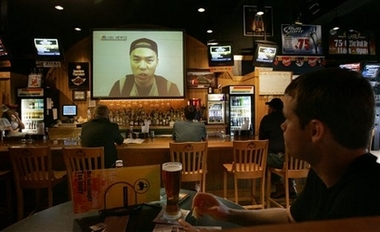Rules should have barred weapon purchase
(AP)Updated: 2007-04-20 11:29
McLEAN, Va. - A judge's ruling on Cho Seung-Hui's mental health should have barred him from purchasing the handguns he used in the Virginia Tech massacre, according to federal regulations. But it was unclear Thursday whether anybody had an obligation to inform federal authorities about Cho's mental status because of loopholes in the law that governs background checks.
 Customers watch a video of Cho Seung-Hui on the NBC Nightly News as they dine in a local restaurant Blacksburg, Va. on Wednesday, April 18, 2007. [AP]  |
"On the face of it, he should have been blocked under federal law," said Denis Henigan, legal director of the Brady Center to Prevent Gun Violence.
The 23-year-old South Korean immigrant was evaluated by a psychiatric hospital after he was accused of stalking two women and photographing female students in class with his cell phone. His violence-filled writings were so disturbing that professors begged him to get counseling.
The language of the ruling by Special Justice Paul M. Barnett almost identically tracks federal regulations from the Bureau of Alcohol, Tobacco, Firearms and Explosives. Those rules bar the sale of guns to individuals who have been "adjudicated mentally defective."
The definition outlined in the regulations is "a determination by a court ... or other lawful authority that a person as a result of marked subnormal intelligence, or mental illness ... is a danger to himself or to others."
Virginia State Police send information on prohibited buyers to the federal government. They maintain that the sale was legal under state law and would have been barred only if the justice had committed Cho to a psychiatric hospital. Barnett ordered outpatient treatment instead.
The Virginia attorney general's office declined to discuss the application of gun laws to Cho's case. Barnett also declined to comment.
The state uses a slightly different standard than the federal government, barring sales to individuals who have been judged "mentally incapacitated."
George Burke, a spokesman for Democratic Rep. Carolyn McCarthy of New York, said millions of criminal and mental-health records are not accessible to the National Instant Criminal Background Check System, mostly because state and local governments lack the money to submit the records.
McCarthy has sponsored legislation since 2002 that would close loopholes in the national background check system for gun purchases.
Initially states were required to provide all relevant information to federal authorities when the instant background checks were enacted, but a US Supreme Court ruling relieved them of that obligation.
"The law is very confused about this," said Richard Bonnie, a professor of law and psychiatry at the University of Virginia who heads a state commission on mental-health reform. "The source of the confusion is the relation between federal and state law."
Also Thursday, the owner of an Internet gun store based in Green Bay, Wis., told The Associated Press that Cho used his Web site to purchase one of the weapons used in the shootings. Cho paid $268 for the gun.
Eric Thompson, who runs http://www.thegunsource.com, said the Walther .22-caliber handgun was then shipped to a Virginia pawnbroker so Cho could pick it up.
Thompson said he had no idea his business was involved until he was contacted Tuesday by ATF agents.
"I just feel absolutely terrible that this tragedy even happened in the first place," he said.
|
||
|
||
|
|